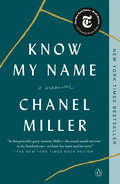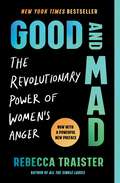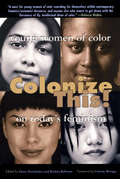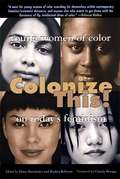Special Collections
NYPL's 2020 Election Reading List
Description: The books on this list cover voting issues including healthcare, education, climate change, and foreign policy, and explore subjects including political polarization, the media, and movements toward greater justice and equity.
- Table View
- List View
Know My Name
by Chanel MillerThe riveting, powerful memoir of the woman whose statement to Brock Turner gave voice to millions of survivors
She was known to the world as Emily Doe when she stunned millions with a letter. Brock Turner had been sentenced to just six months in county jail after he was found sexually assaulting her on Stanford's campus.
Her victim impact statement was posted on BuzzFeed, where it instantly went viral--viewed by eleven million people within four days, it was translated globally and read on the floor of Congress; it inspired changes in California law and the recall of the judge in the case. Thousands wrote to say that she had given them the courage to share their own experiences of assault for the first time.
Now she reclaims her identity to tell her story of trauma, transcendence, and the power of words. It was the perfect case, in many ways--there were eyewitnesses, Turner ran away, physical evidence was immediately secured. But her struggles with isolation and shame during the aftermath and the trial reveal the oppression victims face in even the best-case scenarios.
Her story illuminates a culture biased to protect perpetrators, indicts a criminal justice system designed to fail the most vulnerable, and, ultimately, shines with the courage required to move through suffering and live a full and beautiful life.
Know My Name will forever transform the way we think about sexual assault, challenging our beliefs about what is acceptable and speaking truth to the tumultuous reality of healing. It also introduces readers to an extraordinary writer, one whose words have already changed our world. Entwining pain, resilience, and humor, this memoir will stand as a modern classic.
A New York Times Bestseller
Good and Mad
by Rebecca TraisterFrom Rebecca Traister, the New York Times bestselling author of All the Single Ladies comes a vital, incisive exploration into the transformative power of female anger and its ability to transcend into a political movement. In the year 2018, it seems as if women’s anger has suddenly erupted into the public conversation. But long before Pantsuit Nation, before the Women’s March, and before the #MeToo movement, women’s anger was not only politically catalytic—but politically problematic.
The story of female fury and its cultural significance demonstrates the long history of bitter resentment that has enshrouded women’s slow rise to political power in America, as well as the ways that anger is received when it comes from women as opposed to when it comes from men. With eloquence and fervor, Rebecca tracks the history of female anger as political fuel—from suffragettes marching on the White House to office workers vacating their buildings after Clarence Thomas was confirmed to the Supreme Court.
Here Traister explores women’s anger at both men and other women; anger between ideological allies and foes; the varied ways anger is perceived based on its owner; as well as the history of caricaturing and delegitimizing female anger; and the way women’s collective fury has become transformative political fuel—as is most certainly occurring today. She deconstructs society’s (and the media’s) condemnation of female emotion (notably, rage) and the impact of their resulting repercussions.
Highlighting a double standard perpetuated against women by all sexes, and its disastrous, stultifying effect, Traister’s latest is timely and crucial. It offers a glimpse into the galvanizing force of women’s collective anger, which, when harnessed, can change history.
A New York Times Bestseller
Colonize This!
by Cherrie Moraga and Daisy Hernández and Bushra RehmanIt has been decades since women of color first turned feminism upside down, exposing the '70s feminist movement as exclusive, white, and unaware of the concerns and issues of women of color from around the globe. Now a new generation of brilliant, outspoken women of color is speaking to the concerns of a new feminism, and to their place in it. Daisy Hernandez of Ms. magazine and poet Bushra Rehman have collected a diverse, lively group of emerging writers who speak to their experience--to the strength and rigidity of community and religion, to borders and divisions, both internal and external--and address issues that take feminism into the twenty-first century. One writer describes herself as a "mixed brown girl, Sri-Lankan and New England mill-town white trash,” and clearly delineates the organizing differences between whites and women of color: "We do not kick ass the way the white girls do, in meetings of NOW or riot grrl. For us, it’s all about family. ” A Korean-American woman struggles to create her own identity in a traditional community: "Yam-ja-neh means nice, sweet, compliant. I’ve heard it used many times by my parents’ friends who don’t know shit about me. ” An Arab-American feminist deconstructs the "quaint vision” of Middle-Eastern women with which most Americans feel comfortable. This impressive array of first-person accounts adds a much-needed fresh dimension to the ongoing dialogue between race and gender, and gives voice to the women who are creating and shaping the feminism of the future.
Colonize This!
by Cherríe Moraga and Daisy Hernández and Bushra RehmanIt has been decades since women of color first turned feminism upside down, exposing the '70s feminist movement as exclusive, white, and unaware of the concerns and issues of women of color from around the globe. Now a new generation of brilliant, outspoken women of color is speaking to the concerns of a new feminism, and to their place in it. Daisy Hernandez of Ms. magazine and poet Bushra Rehman have collected a diverse, lively group of emerging writers who speak to their experience--to the strength and rigidity of community and religion, to borders and divisions, both internal and external--and address issues that take feminism into the twenty-first century. One writer describes herself as a "mixed brown girl, Sri-Lankan and New England mill-town white trash," and clearly delineates the organizing differences between whites and women of color: "We do not kick ass the way the white girls do, in meetings of NOW or riot grrl. For us, it's all about family. " A Korean-American woman struggles to create her own identity in a traditional community: "Yam-ja-neh means nice, sweet, compliant. I've heard it used many times by my parents' friends who don't know shit about me. " An Arab-American feminist deconstructs the "quaint vision" of Middle-Eastern women with which most Americans feel comfortable. This impressive array of first-person accounts adds a much-needed fresh dimension to the ongoing dialogue between race and gender, and gives voice to the women who are creating and shaping the feminism of the future.



